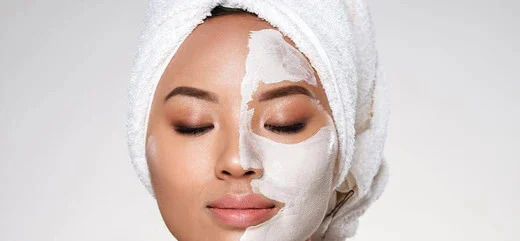Taking care of your skin can be just as important as focusing on your diet and exercise.
A good skincare routine, using the right products, can keep your skin healthy and glowing. It can also have a positive impact on your mental health and overall wellbeing.
But how do you take care of your skin? What are the daily steps you need to take to keep your skin soft, natural and youthful-looking? The good news is there’s no real secret to achieving better skin health. Here’s our guide to how to take care of your skin.
How do I take care of my skin?
By following a few simple principles and daily disciplines, you can help slow the ageing process, prevent skin conditions and achieve that year-round glow you’ve always dreamed of.These include:
Stay Hydrated
The number one tip for maintaining healthy, glowing skin is to keep it hydrated. When your skin cells become too dry, they die off, which can lead to the appearance of flaky skin and, in some cases, rashes or inflammation. You can prevent this by drinking plenty of water, and choosing natural creams, lotions and serums which help moisturise and rehydrate your skin.
Avoid Smoking, Excess Alcohol & Stress
Smoking and alcohol both affect blood flow to the outermost layers of your skin, which can deplete it of oxygen and the nutrients it needs to stay healthy. Smoking can also damage the collagen and elastin that helps your skin stay soft and supple. Over the long-term, this can prematurely age your skin and bring on the appearance of wrinkles and crow’s feet.
Stress, meanwhile, can lead to more sensitive skin and conditions like acne. So, try to relax, get plenty of rest and avoid stressful situations. Aromatherapy can help you maintain a calm, zen-like state.
Be Gentle
If your daily cleaning and grooming routine is too rigorous, it can take a toll on your skin. So, be gentle with yourself. Limit your bath or shower time and use warm rather than hot water. This will help prevent your skin from losing all its natural oils whenever you take a shower.
Choose mild cleansers instead of strong soaps and detergents, which can strip the natural oils from your skin and leave it feeling dry and tight. After washing or bathing, gently pat your skin with a clean towel, rather than rubbing it dry. This will help reduce irritation and maintain some natural moisture on your skin. And finally, moisturise dry skin to keep it hydrated.
Eat Well
Your diet plays an integral part of your overall wellbeing and will help you to achieve and maintain healthy skin. Eat plenty of fruits and vegetables to ensure you get the right blend of natural vitamins and minerals. Avoid foods that are processed and high in sugar or saturated fat, as these can contribute to clogged pores and greasy skin.
If you’re concerned about any nutritional deficiencies, natural supplements can help top-up any shortfalls.
Take Care in the Sun
While getting some sunshine can be beneficial, it’s extremely well-documented that prolonged exposure to the sun’s harmful UV rays can damage your skin and lead to severe skin conditions. So, if you are spending any time outdoors or in direct sunlight, regardless of the time of year, always either cover up or use a skincare product which has some UV protection in it.

How to Pick Skincare Products
With so many brands and products on the market, when it comes to picking skincare products, it can be challenging to know where to start. While a lot of it will come down to personal preference and the type of skin you have, there are a few basic rules to follow to ensure you make the right choice.
When it comes o washing your skin, particularly your face, you should choose a cleanser that doesn’t leave your skin feeling squeaky-clean after washing. If your skin feels tight, it’s probably because you’ve washed away all the natural oils your skin needs to stay healthy and supple.
Look for products that are natural and contain organic ingredients which help to maintain your skin’s delicate pH balance. Also make sure they are free from sulphate, paraben and alcohol, as these are known to dry out your skin and strip away natural oils.
If you use a serum, go for one enriched with Vitamin C, which will help protect your skin’s cells from oxidative stress. And choose one that contains collagen, which will help reduce wrinkles and improve the elasticity of your skin.
When it comes to moisturising, natural and organic is once again the way to go, but you should also choose products that are light, easily absorbed and don’t block your pores.
And try to choose skincare products which offer some degree of UV protection. Even in winter, or when it’s cloudy, the sun’s UV rays can still damage your skin and increase the effects of hyperpigmentation.
You can also find natural, organic oils, gels and exfoliators which help to clean clogged pores, rehydrate and revitalise dry skin and remove any dead cells, for that healthy glow.
You should always look for products that are vegan and vegetarian friendly, are free from common allergens and animal testing and are manufactured to strict ethical standards.
How to Take Care of Dry Skin Daily
Although the above skincare tips are suitable for people of all skin types, if you have dry skin, there are a few additional things you can do to keep it in tip-top condition.
If you limit the number of times you wash your hands and face, this will prevent your skin from being stripped of its natural oils. While you may need to wash your hands several times a day, you should wash your face only in the morning and at night and apply moisturiser straight away.
If you wear make-up, clean it off entirely before you go to bed using a gentle make-up remover. Allow your skin to ‘breathe’, particularly when it’s warm. And when it’s cold, don’t sit directly in front of a fire or radiator. If you sit too close to a direct heat source, it can dry your skin out quickly.
How to Take Care of Oily Skin Naturally
While your skin contains natural oils which it needs to stay healthy and soft, skin that’s too greasy or oily can lead to clogged pores and other problems like acne, spots and blackheads. So, if your skin is naturally oily, there are a few additional steps you can take to keep it healthy.
Cleaning your face twice a day with a gentle cleanser will help to remove any excess oil, bacteria and toxins that can cause greasy skin. Removing any make-up as soon as you get home, or before bed, will also help.
Using a toner after cleaning will help restore your skin’s natural pH balance and remove any excess cleanser or moisture left on the skin.
Exfoliating your skin regularly can also help. Oily skin is usually the result of a build-up of dead skin, which causes excess oil production and can lead to clogged pores. Using a gentle exfoliator to get rid of the dead skin cells can help eliminate this.
And finally, use a light, gentle, natural moisturiser that is easily absorbed by your skin.
Some oil-based or cream-based moisturisers can be too heavy for skin that’s already oily, so choose lighter gel-based moisturisers and serums that quickly rehydrate your skin without leaving behind any oily residue.






